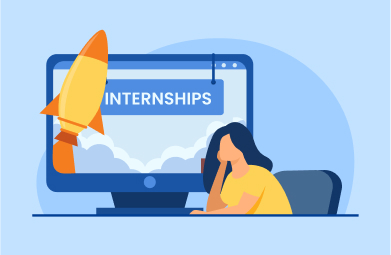14 common HR interview questions and how to answer them

Have you been shortlisted for an interview? Yay! Interviews can be both exciting and intimidating. As amazing as it would be to have a crystal ball to know what awaits us at the interview, we just have to brave it out. The good news is that you can at least prepare for the common interview questions (I wish I had every time I felt flushed during an interview). So, let’s take care of the most common HR interview questions and answers so that you are left with ample time to pick out your interview outfit.
1. Tell me about yourself.
This is a broad question, so it can be difficult to answer it. Rather than narrating your entire life history or reciting your resume, you can tailor your past experiences to the internship or job you are applying for. Describe your educational background, relevant past roles, responsibilities, and skills and what brings you to this interview. Here’s a sample answer for the ‘tell me about yourself’ question –
I am currently pursuing my bachelor’s degree in English from Satyawati College. I am a member of the E-Cell and the creative writing society at my college. I did a winter internship in social media marketing at Craft Walkers and learned that I enjoyed both copywriting and the analytical aspect of marketing. I tend to perform best when I work with a team whose mission I am aligned with, which made me apply to your company because of your stance on sustainable fashion. My hobbies are watching movies and writing short stories.
To learn more about the do’s and don’ts for this question, read how to answer ‘Tell me about yourself’ interview question.
2. Why do you want to work for our company?
If it’s your dream company, then you are probably bursting at the seams to answer this. However, even so, steer clear from generic answers like – because you are a huge brand or I will get the opportunity to work with really talented people. Instead show that you have done your homework about the company. Go through their website, primary services or products, their mission statement, and any recent news updates. Get into the specifics of why you like their company and why you want to work there. If you know someone from the company, talk about how their experience intrigued you and motivated you to apply.
3. Why are you interested in this position?
This is one of the key common interview questions, so be prepared with the best answer. You can think about which aspects of the role make you feel enthusiastic and what are you looking forward to doing at the company. So, basically you should know why you want a particular role in that company and not somewhere else.
Before freelancing as a web developer, I had been interning at an NGO, which taught computer skills to students who had dropped out of school. It was a fulfilling experience, and I have been looking for a tech opportunity that allows me to do something meaningful. I believe that your organisation is doing commendable work in combating education inequality, so I wanted to apply as soon as I found out that you had an opening.
4. Why should we hire you?

Now that you have told your recruiter why you want the position, it’s time to tell them why they should hire you. You can provide more details about the achievements that you have listed on your resume. Be prepared with specific stories of successes at work and skills that you can bring to the table.
This question can also be an opportunity to show that you understand the pain points of the company. Besides saying how your skills and experience will help resolve these, you can bring forth your unique ideas that will set you apart from other candidates.
5. Tell me about a time when you made a mistake.
Through this question, recruiters want to know if you can own up to your mistakes, make amends, and improve. Begin with concisely describing the situation, tell what went wrong, and end with what steps did you take to improve the situation. For example –
When I started as a content writing intern, I took responsibility for more assignments than I could deliver and soon got overwhelmed, which caused me to miss deadlines. I communicated this to my manager, who helped me set my goals more efficiently. Once I was able to establish my pace, I started working on more assignments.
6. What are your hobbies?
What may seem like a trick question could be a way for recruiters to put you at ease or to know more about your personality. Be honest with the answer and mention your hobby and what you love about it. For example –
I enjoy playing video games as it compels me to think of new ways to deal with challenges. It also allows me to spend time with friends.
However, do not mention hobbies that could threaten your work ethic.
7. Tell me something about yourself that is not on your resume.
While creating your resume, you may have chosen to highlight key details in your professional history. With this question, you can dive into more details about the same. For example, if you mention that during your marketing internship, the engagement rate increased, you can elaborate on what steps you took.
Other ways to answer this question is by mentioning a hobby that you could tie to the role or the work culture. You can also mention an initiative you took at work by going out of your way.
8. What are your career goals?/Where do you see yourself in five years?
This question aims to understand whether your professional goals are aligned with the position you are applying for. They may also ask this to understand if you would stay with the company for long-term. Think about how the internship or job will help you achieve your goals. For example, you may want to gain a thorough understanding of a field, advance in your role, and take on more responsibility by stepping into a leadership position. In case you are taking on the role to help you decide on future goals, then you can say that.
9. What is your dream job?
Ideally, your dream job should be connected to the position you’re applying for. So, you may need to tread carefully with this question. Your dream job could involve using more skills that you enjoy. Additionally, it should show your ambition to grow. Besides work, your dream job could also involve working in a certain type of work environment. For instance, perhaps you want to work in a startup where you get more ownership over your work.
10. What are your strengths and weaknesses?
While specifying your strengths, you need to be careful about the thin line between confidence and arrogance. Choose a strength that is most relevant to the role and back it up with example/s. For example, if you are applying for a data science position, then you can say that you have strong storytelling skills that allow you to communicate your insights effectively.
By asking your weaknesses, the recruiter is trying to understand how self-aware you are and how proactive you are in improving. For example –
During one of my internships, I struggled with giving presentations because English is not my first language. So, I enrolled in an online course and engaged in everyday conversations with more people. This helped me in becoming more confident in the language, and I have been able to deliver better presentations.
Also, avoid anything that could deter your chances of getting hired. For example, inability to meet deadlines is a no-go.
11. Why is there a gap in your resume?
Although the HR professionals may have got used to seeing a gap in resumes this year, it still helps to be prepared for it, especially if it was a long gap. Be transparent in your response. You can also talk about any new learnings during the gap.
12. What kind of manager do you work best with?
This gives the recruiter an insight into your working style and can save you the trouble of working with someone whose management style you cannot adapt to. Give an honest answer but also show that you are open to trying a new style. If you have interned before, give an example of a manager that you enjoyed working with and state why.
13. What are your salary expectations?
This may put you in a tough spot. One way to prepare yourself is by doing your research and calculating your salary through PayScale or Glassdoor. Take into account how much employees get paid in your role at your job location and how much experience you have.
14. Do you have any questions for me?
Interviews are a two-way process. Now that the recruiter knows about you, this is your opportunity to learn more about the job or company.
1. What are the important cultural values at your company?
2. What is the performance review process here?
3. Are there any training programs that the employees can take?
4. What are the next steps in the hiring process?
While curiosity is good, some questions that are an absolute no-no include asking about benefits, vacation, and salary. To learn more, read the art of asking questions at the end of an interview.
Now that you know how to answer the most common interview questions, let’s discuss a few tips that will help you ace the HR interview:
1. Always research about the company and review the role you are applying for. It shows that you aren’t merely applying for any opening and that you are serious about the opportunity.
2. Do not crib about your past employers. Although it’s acceptable to talk about things that did not work out for you, avoid projecting yourself as a victim. It can come off as a red flag for the recruiters.
3. Practise conciseness for your answers. Be detailed in your responses and cover the relevant points but avoid digressions.
4. While citing examples or telling stories, you can use the SOAR technique wherein you segment your story into four parts – situation, obstacles, action, and results.
Sounds interesting? Learn more about using the SOAR framework for interviews.
Now that you know how you can prepare for the most HR interview questions and answers, go ahead and shine in that interview! If you are still looking for work opportunities, then you can apply for internships and fresher jobs on Internshala.
If you need a helping hand with your preparation, you can also check out Internshala’s Internship and Job Preparation Training. Use BLOG10 to get a discount of 10%.
Image credits: <a href=’https://www.freepik.com/vectors/computer’>Computer vector created by pch.vector – www.freepik.com</a>
<a href=’https://www.freepik.com/vectors/business’>Business vector created by katemangostar – www.freepik.com</a>



